Key takeaways
- Understanding climate change policies involves a mix of science, economics, and politics, with a focus on how these impact individuals and communities.
- US Republican campaigns often frame climate policies in terms of economic growth and individual freedom, highlighting energy independence and market-driven solutions.
- Effective political discussions about climate change benefit from listening, connecting policies to shared values, and using personal stories to make the conversation relatable.
- Adapting messaging to align with community interests and emphasizing opportunities rather than restrictions can enhance receptiveness to climate initiatives.
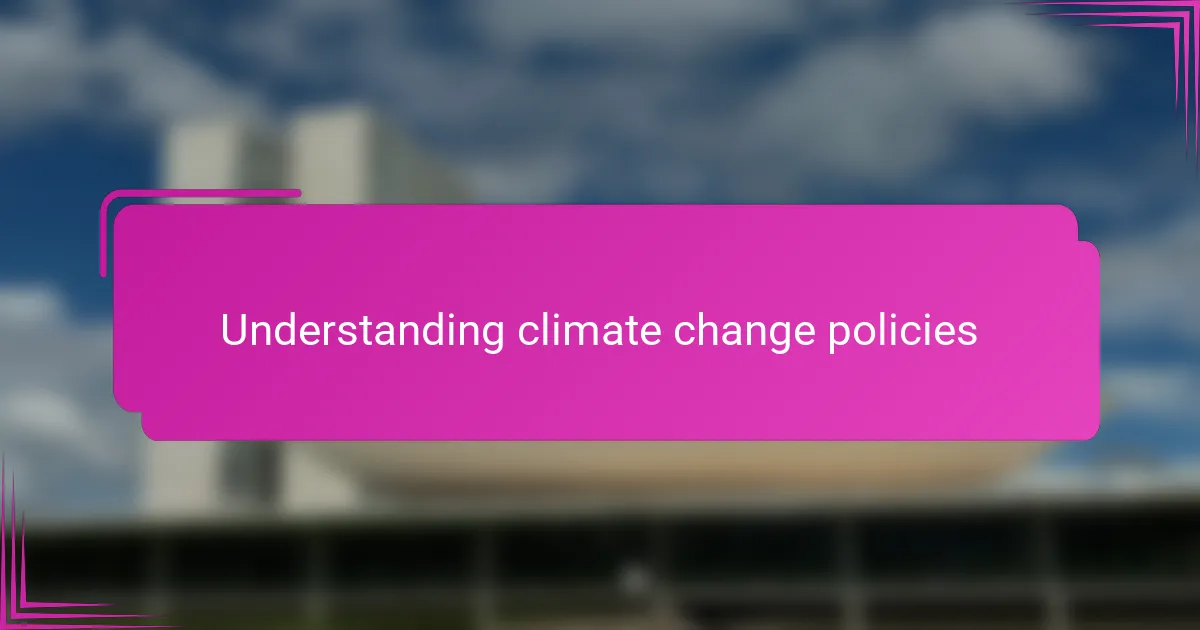
Understanding climate change policies
Understanding climate change policies means diving into a complex web of science, economics, and politics. When I first looked into these policies, I was struck by how often scientific facts collide with political agendas. Have you ever wondered why something so crucial can feel so contentious?
I remember attending a town hall where the discussion around climate policies became heated. It made me realize that grasping the nuances isn’t just about knowing the science—it’s about understanding the impacts on everyday people, industries, and communities. That complexity is what makes these policies a challenge but also an opportunity.
At its core, climate change policy aims to reduce harmful emissions and encourage sustainable energy use. But what does that actually look like in practice? From carbon pricing to regulations on factories, each approach has its champions and critics. Understanding these options helped me see why simplified debates often miss the bigger picture.
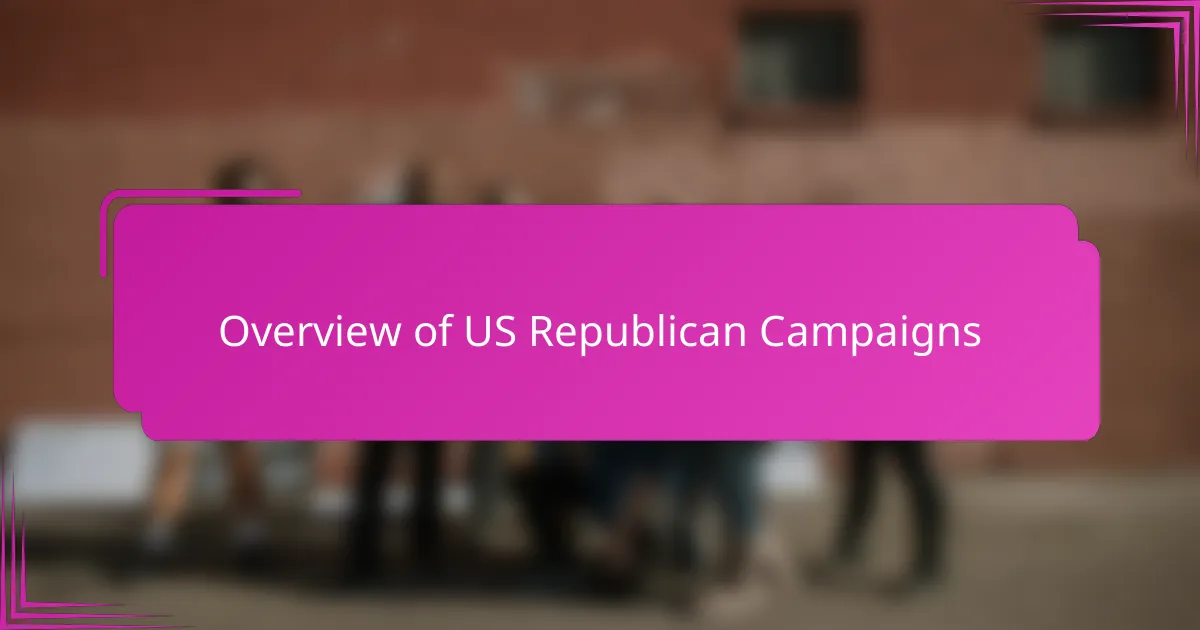
Overview of US Republican campaigns
When I first started following US Republican campaigns, I noticed they often frame climate change policies through the lens of economic growth and individual freedom. It struck me how this approach shapes not just the policy proposals but the entire tone of their campaigns. Have you ever caught a Republican rally and felt that tension between environmental concerns and economic priorities?
I recall watching debates where candidates emphasized energy independence and criticized regulations as government overreach. It made me think about how deeply these values resonate with their base and influence messaging strategies. It’s clear that for many Republicans, policies must align with principles like market solutions rather than mandates.
What stood out to me even more was how these campaigns adapt depending on the region and voter priorities. In some states, candidates highlight innovation in clean energy, while in others, they focus on protecting traditional industries. This adaptability shows how diverse the party’s approach to climate and related issues really is.
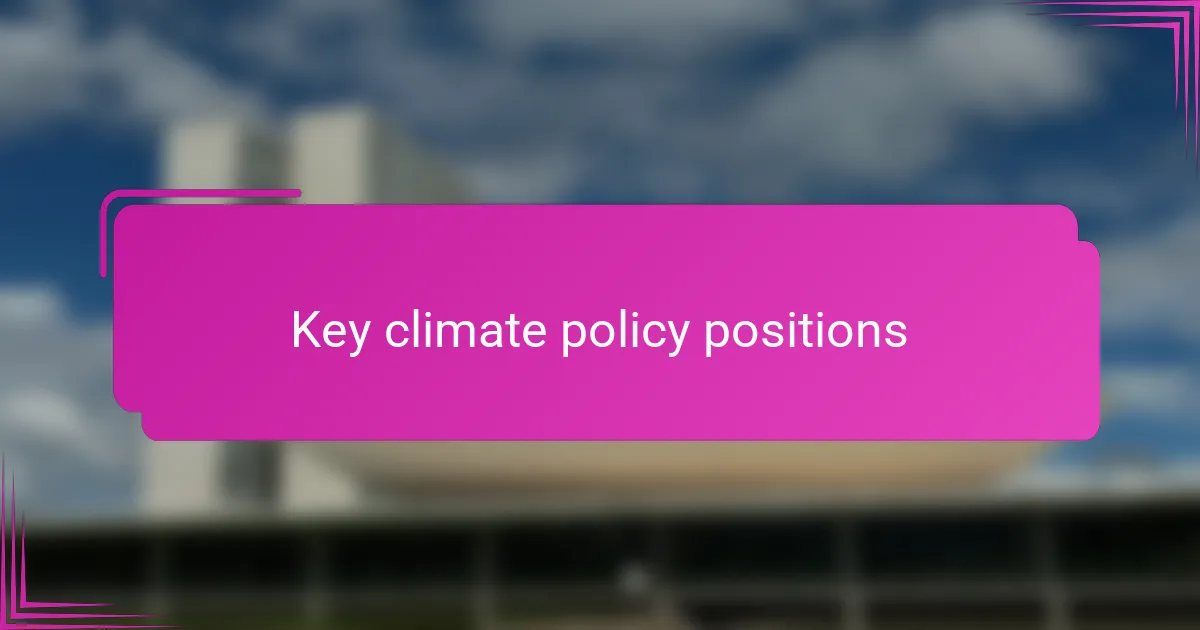
Key climate policy positions
What really caught my attention about key climate policy positions within Republican campaigns is their consistent emphasis on balancing environmental concerns with economic freedom. For instance, I remember reading a policy outline that prioritized deregulation to boost energy innovation—doesn’t that make you wonder how they weigh immediate economic gains against long-term environmental risks?
I also noticed that carbon emissions reduction often comes wrapped in language promoting market-driven solutions, like incentives for clean technology rather than direct government mandates. When I first encountered this approach, it made me think about the trust Republicans place in businesses and consumers to drive change voluntarily—do you think this can really work without stricter regulations?
Another thing I found intriguing is the focus on energy independence. During a campaign event, a candidate passionately argued that supporting domestic fossil fuels ensures national security and job preservation. It struck me how this viewpoint ties climate policy directly to everyday concerns like employment and patriotism, making the debate feel much more immediate and personal.
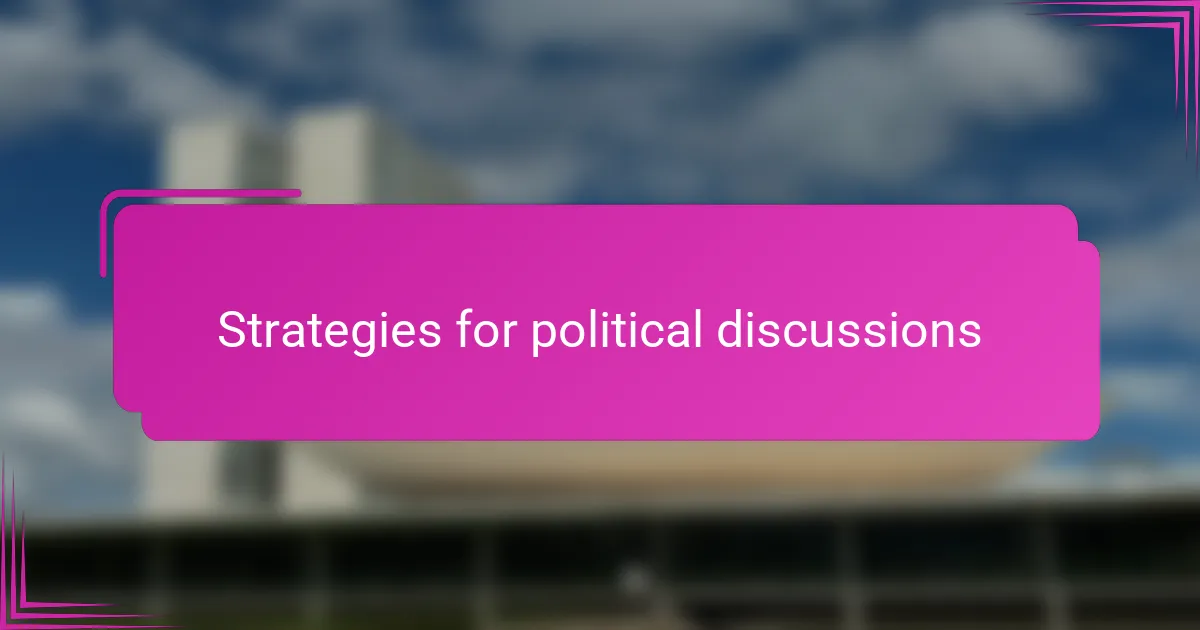
Strategies for political discussions
When entering political discussions about climate change policies, I’ve found it crucial to listen more than I speak at first. Asking open-ended questions often reveals the values and concerns that shape someone’s views, which helps me tailor my points to what truly matters to them. Have you ever noticed how a conversation shifts when you genuinely seek to understand rather than just respond?
I also try to anchor my arguments in shared priorities like economic opportunity or national security. For example, highlighting how certain clean energy innovations can create jobs tends to resonate better than starting with abstract environmental concepts. It took me a few conversations to realize that connecting policy details to tangible benefits makes the dialogue more productive.
Of course, it’s tempting to dive into facts and figures, but I’ve learned that framing matters just as much. Using stories or relatable examples often opens doors that data alone can’t. When I shared a local story about a community adapting to new energy projects, I saw how personal narratives can bridge divides and soften entrenched positions. Would you agree that stories often speak louder than statistics?
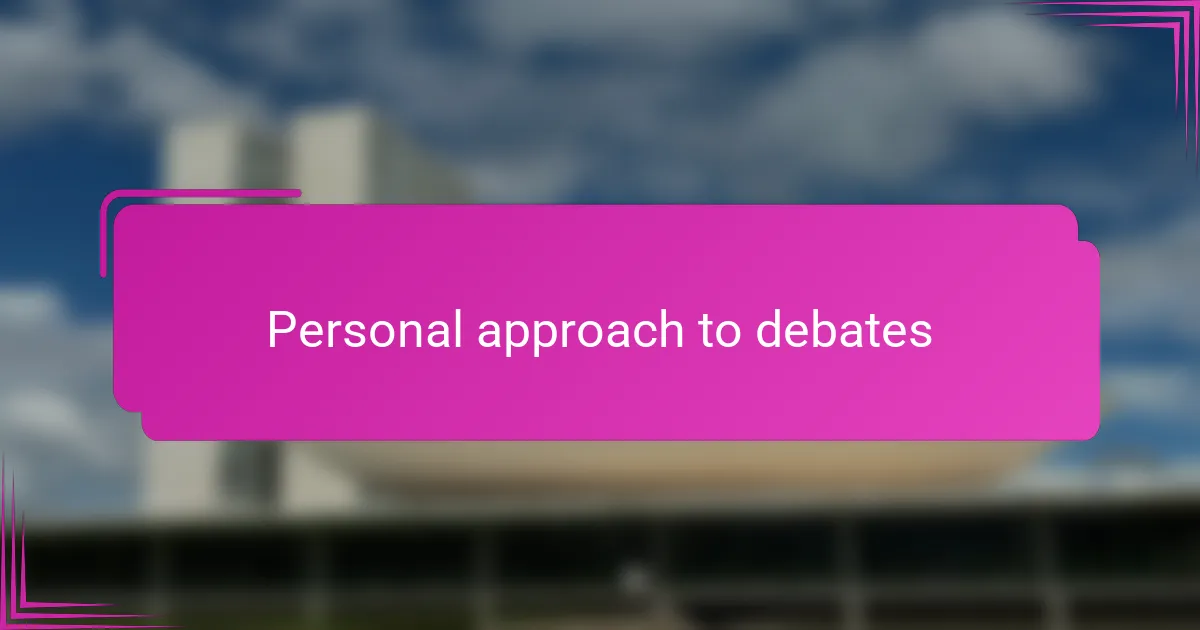
Personal approach to debates
In debates about climate change policies, I’ve found that staying calm and respectful creates more space for meaningful exchange. Have you ever noticed how heated discussions can shut down rather than open minds? By focusing on listening first, I avoid turning the conversation into a confrontation, which really helps.
Sometimes, I share my own doubts or uncertainties early on—it surprises people and makes the dialogue feel more genuine. For instance, admitting that I don’t have all the answers allowed someone to open up about their concerns without feeling judged. That human connection often shifts the tone from debate to discussion.
I also try to ask questions that encourage others to reflect, like, “What kind of future do you want for your community?” This approach moves the talk from abstract policy details to personal values. In my experience, that makes the debate less about winning and more about understanding.
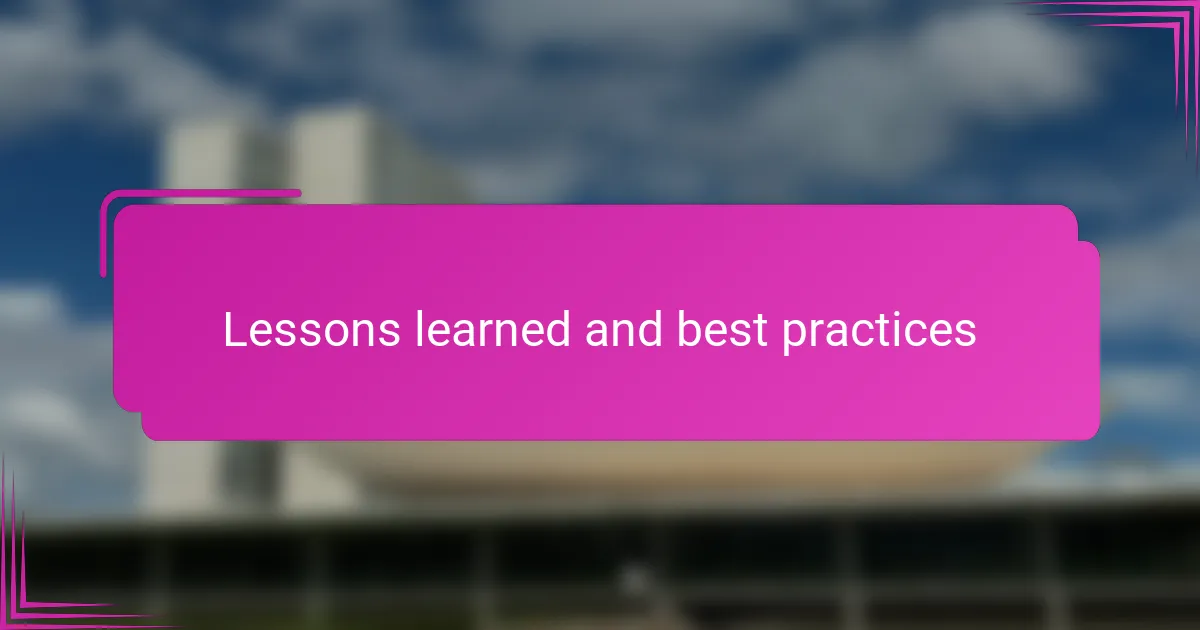
Lessons learned and best practices
One thing I’ve learned is that being patient and open really pays off. When I slowed down and truly listened, people felt heard, and the conversation shifted from confrontation to collaboration. Does it surprise you how sometimes just giving space for others to express themselves can change the entire dynamic?
I also realized it’s important to focus on common ground rather than differences. By connecting climate policies to shared values—like job security or community health—I found that discussions became less about politics and more about people’s lives. Have you tried reframing debates in this way? It often makes the other side more receptive than you might expect.
Lastly, sharing personal stories proved powerful in breaking barriers. When I talked about local examples of how clean energy projects impacted real families, it transformed abstract policies into something tangible and relatable. I wonder, what stories from your own experience could help bridge divides in these tough conversations?
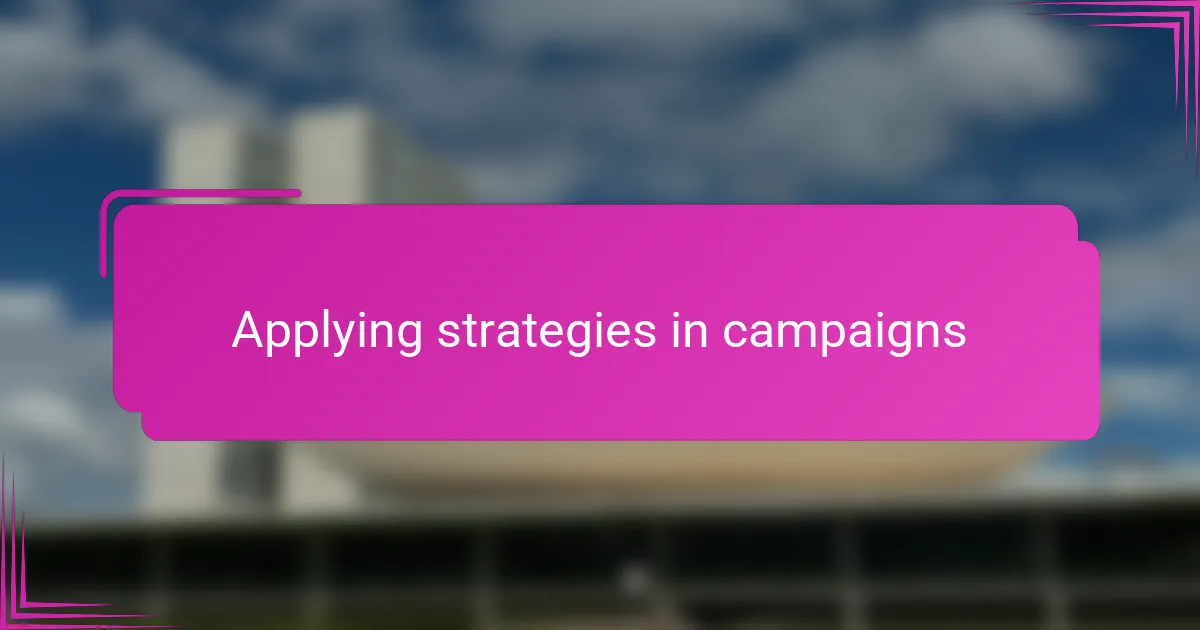
Applying strategies in campaigns
Applying strategies in campaigns means more than just sticking to talking points—it’s about reading the room and adjusting on the fly. I remember a campaign event where the initial message about climate change fell flat, so we pivoted quickly to discussing job creation through clean energy, which really got people’s attention. Have you ever noticed how a small shift in framing can turn skepticism into genuine interest?
Another strategy I found essential is aligning the climate message with core Republican values like economic freedom and innovation. Instead of presenting policies as restrictions, I talked about them as opportunities for entrepreneurial growth and market leadership. It felt rewarding to see how this approach resonated more authentically with the audience.
Finally, I’ve seen firsthand how incorporating local examples tailored to the community’s unique concerns makes campaigns more effective. During one outreach, highlighting investments in preserving traditional industries alongside new energy projects helped bridge divides I thought were too wide to cross. Doesn’t it make sense that people connect best with issues when they feel directly impacted?